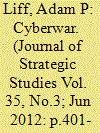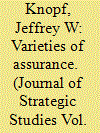| Srl | Item |
| 1 |
ID:
113862


|
|
|
|
|
| Publication |
2012.
|
| Summary/Abstract |
For 74 days in mid-1999, India waged an intense war against intruding Pakistani forces on the Indian side of the Line of Control dividing Kashmir in the Himalayas. The Indian Air Force (IAF) was a key contributor to India's eventual victory in that war. Among other things, the IAF's combat performance showed how the skillful application of air-delivered firepower, especially if unmatched by the other side, can shorten and facilitate the outcome of an engagement that might otherwise have persisted indefinitely. It also showed that a favorable position in the conventional balance remains strategically useful even in conditions of mutual nuclear deterrence.
|
|
|
|
|
|
|
|
|
|
|
|
|
|
|
|
| 2 |
ID:
113866


|
|
|
|
|
| Publication |
2012.
|
| Summary/Abstract |
This article examines the implications of the proliferation of cyberwarfare capabilities for the character and frequency of war. Consideration of strategic logic, perceptions, and bargaining dynamics finds that the size of the effect of the proliferation of cyberwarfare capabilities on the frequency of war will probably be relatively small. This effect will not be constant across all situations; in some cases the advent of cyberwarfare capabilities may decrease the likelihood of war. On the other hand, the use of computer network attack as a brute force weapon will probably become increasingly frequent.
|
|
|
|
|
|
|
|
|
|
|
|
|
|
|
|
| 3 |
ID:
113863


|
|
|
|
|
| Publication |
2012.
|
| Summary/Abstract |
American policy-makers are predisposed towards the idea of a necessary war of survival, fought with little room for choice. This reflects a dominant memory of World War II that teaches Americans that they live in a dangerously small world that imposes conflict. Critics argue that the 'choice versus necessity' schema is ahistorical and mischievous. This article offers supporting fire to those critiques. America's war against the Axis (1941-45) is a crucial case through which to test the 'small world' view. Arguments for war in 1941 pose overblown scenarios of the rise of a Eurasian super-threat. In 1941 conflict was discretionary and not strictly necessary in the interests of national security. The argument for intervention is a closer call that often assumed. This has implications for America's choices today.
|
|
|
|
|
|
|
|
|
|
|
|
|
|
|
|
| 4 |
ID:
113865


|
|
|
|
|
| Publication |
2012.
|
| Summary/Abstract |
Strategies that seek to assure other states about their security have the potential to reduce international conflict and dissuade states from seeking nuclear weapons. Yet, relative to other tools of statecraft such as deterrence, assurance remains understudied. To facilitate further empirical research on assurance strategies, this article identifies variations in the terminology scholars and policymakers have used to refer to such strategies and describes the concept of assurance associated with each variant. It seeks to clarify and standardize usage and show that there is a general, overarching concept of assurance that links the different variants. It also summarizes existing bodies of empirical research that are relevant to assessing the utility of different forms of assurance.
|
|
|
|
|
|
|
|
|
|
|
|
|
|
|
|
| 5 |
ID:
113864


|
|
|
|
|
| Publication |
2012.
|
| Summary/Abstract |
Following costly military defeats political elites usually attempt to persuade their publics that the battlefield outcome was not a shameful defeat but a 'moral victory'. Yet, only sometimes their public accepts these claims. The paper tries to explain this variation in the domestic publics' perceptions in the cases of non-democratic entities. It is argued that the key variable that determines actors' success in claiming a moral victory is the existence of certain battlefield elements, or at least symbolic military acts/achievements of the defeated actor which can persuade his public that these battlefield elements existed. Propaganda efforts to misrepresent the battlefield facts can play only a secondary role and only under certain conditions.
|
|
|
|
|
|
|
|
|
|
|
|
|
|
|
|